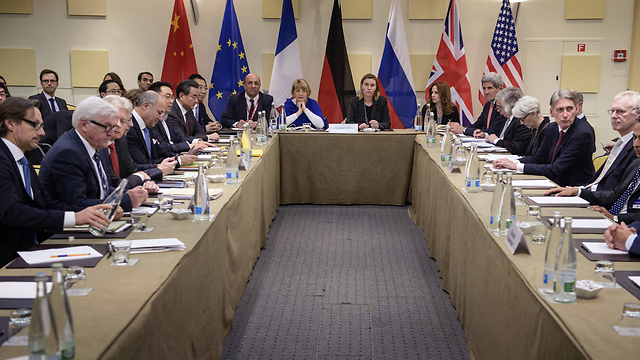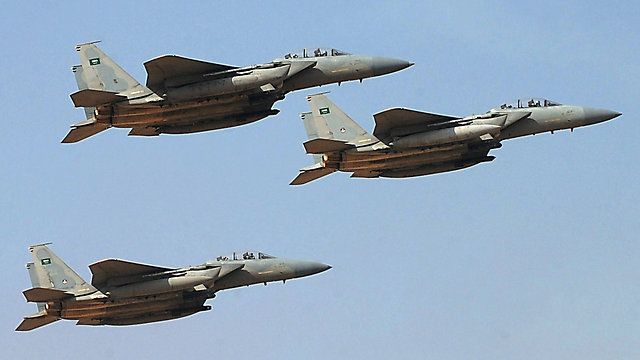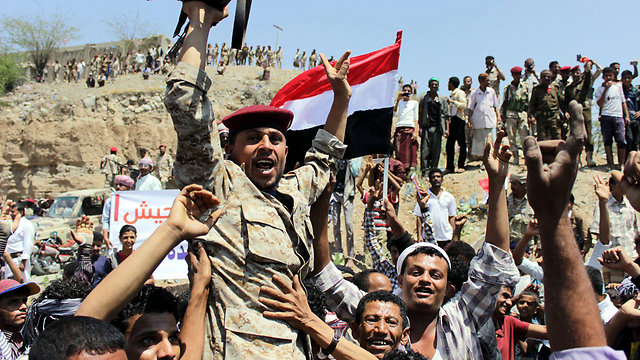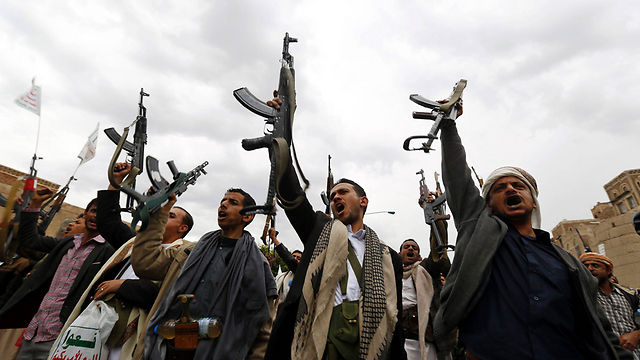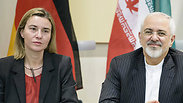
Nuclear deal will be good for Iran, bad for Iranians and bad for Israel
Analysis: If signed, framework agreement between Tehran and world powers will mostly serve as lifeline for Shiite terror state, saving it from economic collapse; also, should Israel worry about formation of united Arab military over war in Yemen?
In recent days, a military force has been taking shape against the Shiite threat and other terror threats - a united Arab military force sponsored by the Arab League. Should this force concern Israel?
Is the US saving Iran?
The Iranian nuclear threat is an issue that concerns any Israeli, particularly in recent days with a framework deal between the United States and Iran on the cards. This deal will ensure one thing – it will save the Shiite terror state from complete economic collapse.
Iran has a lot of expenses and different commitments: Funding Hezbollah in Lebanon so it can continue ruling the country; interfering in the Syria conflict in favor of a regime that slaughters its people, by providing the Assad regime with military and logistical aid; and persisting with its threats against Israel with thousands of missiles and fighters. Recently, Iran acquired an additional expense when it opened a new front against Israel on the Golan Heights. In addition, Iran is funding and arming the Houthi Shiite rebels in Yemen and funding Shiite militias in Iraq.
All of this costs a fortune. Where are the Iranians going to get so much money from while they remain under international sanctions?
On top of it all, the Saudis have lowered oil prices, leaving the Iranians with no avenues of revenue. The Iranian middle class is frustrated from high rates of unemployment, the students have no future and many live in poverty and descend into drugs and prostitution.
The only thing preventing riots in the Islamic Republic - like the ones that erupted in 2009 - is the presence of the Revolutionary Guards and the Basij (civilian militias), who are able to maintain stability using fear and internal terrorism.
Now, the US just might solve Iran's economic problems - not for the Iranian people, who will continue being poor, but for the army, of course - by removing the sanctions. What will Iran do in return? Allow very problematic supervision of its nuclear facilities, reduce rather than eliminate the technology it has for building a nuclear bomb, and avoid any normalization of ties with the Western world.
Sunni world on alert
Israel is hard at work on anti-missile defense in the hope that such advanced systems could deal with the Iranian threat, but this isn't the case in Saudi Arabia and the Gulf states. They don't have a technological solution, no Arrow or Iron Dome.
The members of the Sunni axis understand that the Sunni world's advantage over the Shiites, which has lasted for the past 1,300 years, might soon be undermined. Their solution is launching an arms race in an attempt to obtain a "Sunni nuclear bomb." With that in mind, we can understand Egypt's decision to put out feelers to Russia regarding the construction of nuclear reactors, and Saudi's recent communications with Pakistan - the only Sunni country that currently possesses nuclear capabilities.
Recently, Arab leaders raised the idea of forming a joint Arab military force to deal with the many threats the Arab world is currently facing. This notion was met with wide-scale support in an Arab League meeting held at Sharm el-Sheikh this week.
A united Arab force
What could be a better celebration of the Arab League's 70th year than an attempt at reviving pan-Arab nationalism? In his speech at the Sharm el-Sheikh conference, Egyptian President Abdel Fattah al-Sisi called for the establishment of a united Arab military force headed by senior officers from select countries, which would serve as an expression of solidarity among Arab nations.
He later mentioned several states without specifically stating whether the Arab army will be responsible to settle the conflict raging in them, but the hint was clear - after Iraq and Yemen, Libya and Syria will be next.
The United States and a coalition of Western and Arab countries already started bombing Islamic State bases in east Iraq and in northwest Syria several months ago, and there's a lot still left to do. Meanwhile, al-Sisi specifically stressed the Saudi-led Arab coalition's responsibility for the well-being of Yemen.
Other than the Islamic State and the Houthis, the joint Arab military force will have to face several other challenges, primarily the one in Libya. Al-Sisi called for the strengthening of the Libyan army and for the removal of UN sanctions against it to allow it to eliminate terror cells in the country, particularly branches of the Islamic State.
But while the Arab League conference earmarked Syria as the next challenge after Libya, any discussions on the topic remain secret. Openly, the Saudi king harshly criticized Russia for its continued support of Bashar Assad's murderous regime.
Ramifications of Yemen crisis
There is no doubt Iran erred when it encouraged the Houthi rebels to take over Yemen and to refuse offers of compromise. While Iran crossed red lines in the past, it did not foresee the harsh Saudi response to its interference in Yemen.
Not only did this crisis lead to the formation of the aforementioned Arab force - which is actually a Sunni force - but it's likely that the war in Yemen has a negative effect on nuclear negotiations between Iran and six Western nations, a lot more than Prime Minister Benjamin Netanyahu's address to Congress.
The Houthi crisis reminded those negotiating with Iran that removing the sanctions will strengthen Gulf States' enemies and anger the world's largest oil exporter.
The Yemen crisis has managed to unite the quarreling Sunni world, putting Arab hatred of the Persians and the Sunni world's dislike of Shiites front and center. Even Sunni states outside the Arab world - like Sudan, Pakistan and Turkey - have agreed to aid Saudi Arabia in its fight against the Houthis in Yemen.
Is Palestine next?
The announcement on the formation of the united Arab force raised questions on whether the united military could really solve the many crises in the Arab world, including the "occupation of Palestine."
Yusri al Azbaui of the Cairo-based Institute of Arab Research and Studies rejected the possibility that a united Arab force can tackle the Palestinian issue, noting the IDF has a military advantage over the Arab coalition, that the US will not allow such a force to fight against its ally, and that the countries that are to form this Arab military are not interested in a war against Israel.
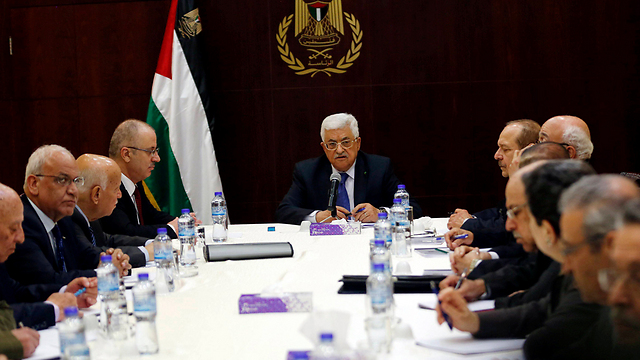
In an interesting comment made to Egyptian newspaper al-Ahram, Dr. Mahmoud al-Habash, the PA Minister of Religious Affairs and an advisor to Palestinian President Mahmoud Abbas, called on the planned united Arab army to launch an "Operation Decisive Storm" (the name of the Saudi-led military operation in Yemen) against Hamas in Gaza, because, according to al-Habash, Hamas violently overthrew the legitimate leader, Abbas, just as the Houthis rebelled against the president of Yemen. It's important to note, however, that in the past, al-Habash called for the "conquer all of Palestine."
Abbas raised the Palestinian issue at the Sharm el-Sheikh conference, claiming his hand is still extended in peace. At the same time, he also claimed that there's no partner for negotiations in Israel following the recent elections.
He implied that the Arab military needs to interfere against Hamas, not against Israel. The Palestinian president welcomed the idea of forming an Arab force that unites the Arab world, and compared it to the success of the Joint Arab List in the Israeli elections that led to 13 seats in the Knesset.
It's important to remember, however, that in the past the idea of a joint Arab force only ever became a reality in wars against Israel in 1948, 1967 and 1973. In addition, between the years 1958-1961, Egypt and Syria came together to form the United Arab Republic led by Gamal Abdel Nasser, an attempt that failed after only three years. Is pan-Arabism possible without one of its historic characteristics - the fight against Israel?
Unity is power, and power is a good thing when it's aimed against Iran's terrorism and undermining, but who is this power going to be aimed against in the future? We cannot know.
Dr. Yaron Friedman, Ynet's commentator on the Arab world, is a graduate of the Sorbonne. He teaches Arabic and lectures about Islam at the Technion, at Beit Hagefen and at the Galilee Academic College.










